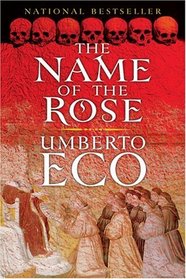Sophia C. reviewed The Name of the Rose: including Postscript to the Name of the Rose on + 289 more book reviews
Helpful Score: 4
If historical fiction is to be judged based on how well it transports the reader back to a specific moment in time, then Umberto Eco's The Name of the Rose is an exemplary text. From its clever (and completely fictional) preface to a "discovered" manuscript by an aged Adso of Melk, the reader is plunged into 1327, when Adso, then a young novice, accompanies his master William of Baskerville on a delicate mission to a wealthy northern Italian abbey. While sent to hammer out the conditions under which Michael of Cesena (a real historical figure) will answer the Papal summons to Avignon, the pair are engaged in another quest: to discover who or what is behind the deaths of half-dozen monks, which pile up by the day during their week long stay. The investigation centers on the abbey's labyrinthine library, supposedly the best in all of Christendom, forbidden to all except the librarian who guards its secrets.
Alas, other historical fiction is to be judged on other criteria as well, e.g. readability. Umberto Eco unabashedly claims that the first hundred pages or so are meant as a "penitential obstacle" to select for his desired reader. The next four hundred pages are not light reading either: often consisting of long sentences stitched together by many commas, many pages are devoted to espousing various positions on Apostolic poverty and whether Christ laughed or not. Readers unfamiliar with or uninterested in medieval Latin, various heretical offshoot sects, or power struggles in the medieval Church might find themselves skimming over many long passages in favor of the mystery, which is partly so engaging because of its main sleuth. Student of Roger Bacon and an Inquisitor who resigned, William of Baskerville uses empiricism, logic, and deduction instead of high-tech tools to get to the bottom of the mysterious monkish deaths. An intellectual tale, The Name of the Rose is a postmodernist novel best enjoyed if the reader can embrace it in its totality.
Alas, other historical fiction is to be judged on other criteria as well, e.g. readability. Umberto Eco unabashedly claims that the first hundred pages or so are meant as a "penitential obstacle" to select for his desired reader. The next four hundred pages are not light reading either: often consisting of long sentences stitched together by many commas, many pages are devoted to espousing various positions on Apostolic poverty and whether Christ laughed or not. Readers unfamiliar with or uninterested in medieval Latin, various heretical offshoot sects, or power struggles in the medieval Church might find themselves skimming over many long passages in favor of the mystery, which is partly so engaging because of its main sleuth. Student of Roger Bacon and an Inquisitor who resigned, William of Baskerville uses empiricism, logic, and deduction instead of high-tech tools to get to the bottom of the mysterious monkish deaths. An intellectual tale, The Name of the Rose is a postmodernist novel best enjoyed if the reader can embrace it in its totality.
Nancy D. (colafemina) reviewed The Name of the Rose: including Postscript to the Name of the Rose on + 83 more book reviews
Helpful Score: 1
One of my all time favorites. I loved this book when it was first available in the US and kept wishing I had time to read it again . . . the story was so good that I wanted to read it again to follow up on the many tantelizing details of information that was new to me.
Stephanie W. (tuxaby) reviewed The Name of the Rose: including Postscript to the Name of the Rose on + 8 more book reviews
Helpful Score: 1
I would not list this as one of my favorite books. I know people love it so it makes me sad taht I didn't. The main story line is engrossing (and why I did finish the book) but there was way too much "preachiness" and history that I felt detracted from the book not adding. I thought the book was just ok.
Helpful Score: 1
Although I really liked the characters and the plot, there were too many parts that dragged with description, history of heresy, and philosophical topics.
This book is a masterpiece.
This is a great book for anyone who loves books, mysteries, and medieval times.
Mike K. reviewed The Name of the Rose: including Postscript to the Name of the Rose on + 4 more book reviews
While it is a well conceived mystery, the philosophical discussions then to slow the pace of the book. I realize this can be considered a classic of prose, it tends to overwhelm the story.
Saw the movie a long time ago; glad that I finally got the book and read it. The movie was at a necessarily different pace--different medium, different target audience, all that--but overall stuck quite close to the original. The novel had longer dialogues, some detailed theological and philosophical discourses, classical Latin quotes here and there: but that is not all bad, because it sets the mood and pace. Eco's stated purpose was to take the reader into an experience of the 14th century era and issues, and he did that quite well. The tale was told by the Adso, the young assistant to William of Baskerville, written decades after the events. Very interesting author's postscript attached three years after publication.
Excellent read.




